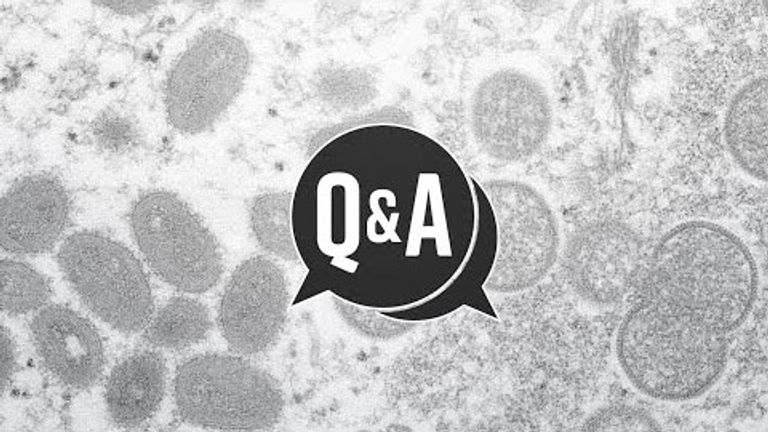[ad_1]
Monkeypox is rare in children, and parents ‘should not be worried’ about the rise in UK cases, experts have said.
The UK Health and Security Agency confirmed 71 cases have been reported in the country today.
But researchers who have been looking into the current outbreak – as well as past cases of the disease – said it is so rare in children that it is more likely any rash is due to chickenpox or hand, foot and mouth disease.
Dr David Porter, paediatric infectious diseases consultant at Alder Hey Children’s NHS Foundation Trust, said: “As a parent with a child that might develop a rash, I don’t think parents should be worried about this being…monkeypox at this stage, because we’re seeing a very low number of cases.
“And in all the previous outbreaks that have occurred outside of Africa over the last few years, we’ve seen very rare numbers of cases in children, so it’s been predominantly in adults anyway.
“And without any contact history with somebody that’s known or strongly felt to have monkeypox, and then if you’ve got a rash at this time of year when we’ve seen lots of rashes from chickenpox and other things in children, hand, foot and mouth disease, then that’s what it’s likely to be.”
The parents of any children who have a rash, and no contact history with someone who has had monkeypox, should be reassured and follow what they normally do.
Experts have also said the virus is “particularly nasty” but it is unlikely we’ll see anything on the scale of COVID.
Transmission occurring in households and healthcare settings
Researchers have also revealed the results of a study looking at seven cases of monkeypox in the UK between 2018 and 2021.
The study, published in The Lancet Infectious Diseases, identified that although limited, transmission within the UK has occurred in household and healthcare settings.
It also observed patient responses to two different antiviral medications developed for, and on standby to treat smallpox: brincidofovir and tecovirimat.
Read more:
How do you catch monkeypox?
What do we know about monkeypox so far?
Tecovirimat might shorten the duration of monkeypox symptoms and reduce the length of time a patient is contagious.
Researchers explained the drug would be given on a case-by-case basis, and in their study, it was given to get a mother out of hospital as soon as possible so she could get home to her daughter.
First author on the paper, Liverpool School of Tropical Medicine’s Hugh Adler, said: “While the study size was small, the data gleaned from the seven cases were rich, providing the team with novel insights and suggesting the direction of travel for future research.”
‘No argument’ for vaccinating gay and bisexual men
In the UK, data suggests a large proportion of cases have been identified in the gay, bisexual, and men who have sex with other men community.
However, researchers say there is no clear argument for vaccinating this population.
Dr Jake Dunning, consultant in infectious diseases and high consequence infectious diseases (HCID) at Royal Free Hospital, said: “We don’t have enough of the signal yet to say that is the correct thing to do, to offer vaccinations to all men who have sex with men.
“This is on the basis that currently they make up a large proportion of the cases that we’re seeing and the challenge is you need data to inform that sort of decision.”
Follow the Daily podcast on Apple Podcasts, Google Podcasts, Spotify, Spreaker
Monkeypox is most likely transmitted through close physical contact, touching clothing, bedding, or towels used by someone with the monkeypox rash, or touching monkeypox skin blisters or scabs.
There is a smaller risk of it being spread through coughs and sneezes, and as prolonged face-to-face contact would be needed, this is not one of the main routes of transmission for the monkeypox virus.
[ad_2]


